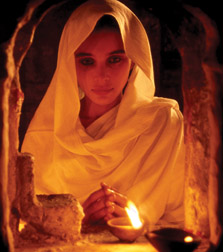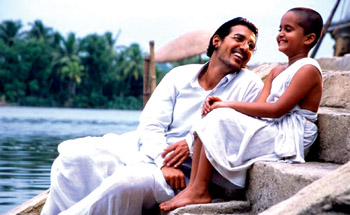|
observer |
|
|
|
|
|
OTHER LINKS |

|

|

|
Water:Denial of life in the name of culture
With a colourful and equally evocative cinematography 'Water' is, perhaps, the most potent social criticism that the contemporary Indian cinema has produced. It questions the validity and morale of some of the rigid and inhuman cultural practices that are still being practiced among secluded impoverish Communities in rural India. The film sets against the background of pre-independent India in the 1930's, when the Indian freedom struggle against the British assumes greater momentum, with the gradual rise of Mahatma Gandhi to power. An eight-year-old Chuiya (Sarala) is being ferried in a canoe along with her father, mother-in-law and her dying husband across Ganges to become a member of a widows' Ashram, the pre-destined plight of thousands of child widows in India. Playful Chuiya's presence in the otherwise monotonous life of the Ashram begins to affect the other members who have been forced to spend their best part of life in seclusion and self-denial, as dictated by the more than 2000 year old Hindu religious teachings. The 80-year-old lady in her waning days, Chuiya meets at the Ashram, reminds her childhood marriage, the death of her husband with a particular sweet that her husband fed her with, at the grand wedding. Chuiya particularly affects 20-year-old Kalyani (played by Lisa Ray of "Hollywood/Bollywood"), 35-year-old Shakuntala (played by Seema Biswas of "Bandit Queen") an 80-year-old. Later Kalyani breaks tradition and falls in love with young upper middle class Ghandhian Idealist, Narayan (played by Bollywood heart-throb John Abraham) forcing the widows to question their future and faith. She ferries across Ganges with the young Gandhian Idealist in the hope of starting life again. However, as soon as Kalyani heard the young Idealist's father's name, she orders the ferryman to turn the boat to the shore and later she takes her life. It is implied that women in the Ashram is being hired for sex through a pimp who guards the Ashram. Underneath the facade of religious piety, widows are exploited in a most pathetic way by abusing the Hindu scriptures. The film depicts characters belonging to every generation, the aunt who had married at the age of 7 and the matriarch of the house, Sadananda (Kulbhushan Kharbanda), a fat woman who eats most of the food, Shakuntala (Seema Biswas), a bitter woman who shows some compassion to Chuiya, and Kalyani (Lisa Ray), a young woman who is allowed to grow her hair out and meet `clients' to help support the house and later commits suicide in the Ganges. The film ends with Chuiya being given to Narayan who goes with Mahatma Ghandhi to the city. 'Water' drives home the message that the vulnerable section in the society and their rights, particularly of women's should be protected. Widow's human rights and right to lead a dignified life after the death of their husbands should not be denied in the name of religion or cultural practices. Child widows lead a miserable life in mourning, suppressing the very basic human feelings. They are also considered 'untouchables' by the Brahmins. Although laws have enacted banning such treatments, the practice goes on unabated, in some communities. Young Narayan (John Abraham), the Ghandhian idealist, sheds light on the emerging generation who do not care much about the traditions and questions the validity and practical fervour of them. Little Sarala, who brilliantly portrays the role of Chuiya, acts in a most natural manner. John Abraham, Seema Biswas, Lisa Ray, Iranganie Serasinghe and Buddhi Wickrama have done justice to their roles. At the 2006 Bangkok International Film Festival, Princess Ubolratana Ramayana of Thailand presented the Golden Kinnaree Award in the International Competition to Deepa Mehta for 'WATER'. At the Annual Genie Awards in Canada, 'WATER' won the awards for Cinematography, Music and the performance by an Actress in a Leading Role, (Seema Biswas). The film is presented by Global Film Marketing and Chandran Rutnam in association with The National Film Corporation of Sri Lanka. With ' Water' Sri Lanka will also enter the list of hot destination for film locations. I firmly believe that this film is exceptional and incomparable. This film is a universal social criticism which applies to any society whether it is Eastern or Western, where people's Fundamental Rights are being violated blatantly in the name of artificial barriers of Religion, Culture, Race, Caste, Region, Ethnicity and bogus patriotism, which divide people from people. However, it is a positive sign that the universal values have found relevance in many societies, transcending Nationalism and Internationalism and in every society people began to see themselves as universal persons realizing the limitations of Nationalism and Internationalism. This would definitely encourage Sri Lankan film-makers to criticise archetype cultural practices that inhibits the realisation of hopes and aspirations of vulnerable sections, such as women, totally due to social evils which have been considered norms. In order to create a strong indigenous culture, we must get rid of the evils that prevail within the society and culture, before fighting against the onslaught of alien forces. It is a pathetic state of affairs that the internationally acclaimed film director, Ashoka Handagama became a victim of religious and cultural puritans who believe in non-existing and imaginary values. ***** A critique: The problems with Deepa Mehta's WaterDeepa Mehta's controversial film Water has come to the Majestic Cinema (Colombo, Sri Lanka). I am yet to see it, but from all I have read and heard, she is a very good filmmaker.
But I have two problems with Mehta with regard to Water. A Sri Lankan girl from Galle plays one of the lead roles in this film. This girl's performance has been appreciated and applauded by all who have seen the film. But Mehta has not given this girl the respect she deserves. She is referred to and credited simply as "Sarala". Sarala who? That is my question. Why couldn't Mehta introduce this girl with her last name? I think Sarala has been used by Mehta. The girl could not speak English, so I'm guessing that neither she nor her parents had a say in how she was credited by Mehta. Thus, she remains as Sarala, the child actress. And also note that another such "child actress", Ayesha Kapoor, who acted in Sanjay Leela Bansali's Black won a Filmfare Award for best supporting actress. Therefore, the lack of attention paid to Sarala has perhaps destroyed her chances at a good career. The other problem I have with Mehta is that she hasn't credited Errol Kelly, the Sri Lankan production designer and art director who was responsible for the construction of the sets and overall production design for Water. Instead, Mehta's brother Dilip has been credited; he may be an acclaimed photographer who got a Time cover when he was 24 (he's in his 50s now), but he is no art director. It was Kelly who was responsible for building a replica of the ghats and Hindu temples, but once again, Mehta has avoided giving deserved credit for Sri Lankan talent. Kelly has worked on numerous Hollywood projects like Indiana Jones and the Temple of Doom, Mother Teresa, Jungle Book and The Iron Triangle. In all these films he has been credited as art director in Sri Lanka." Therefore, isn't it ironic that while the likes of Steven Spielberg and George Lucas have credited him, an Indian does not have the decency to at least mention Kelly's name? **** Five years ago, Deepa Mehta began filming the third part of her trilogy titled "WATER" in India.This triggered violent protests and death threats from hardline Hindu protestors who burnt its sets in India's Northern State of Uttar Pradesh, saying that the film distorted Indian culture. Mehta, an Indian born Canadian citizen received death threats and had to abandon the production. The film, which is set in the 1930s and deals with Hindu child-widows, was therefore stopped. "The film is absolutely not anti-Hindu. The script was read and passed by the very government that protested", said Mehta. Chandran invited Mehta to Colombo and informed her that the film could and should be made in Sri Lanka. Rutnam always believed that no film is worthy of being made without a dramatic message or an important subject matter, which most often, if it is worthy, would be considered controversial by some elements of society. To avoid protests from the hardline Hindu protestors who had no reason to protest, Chandran and Deepa decided to give it a working title called "FULL MOON". The film "WATER" was made entirely in Sri Lanka with locations in Ginthupitiya with the Ghats on the river Ganges, magnificently created by Sri Lanka's own, internationally recognized production designer, Errol Kelly, who has production designed many Hollywood films. 'WATER' was locally line produced by Film Location Services (Pvt.) Ltd. The eight week shooting schedule went very smoothly without any interruption whatsoever, and Deepa Mehta and her producers were satisfied. In a recent interview, when asked what the story of "WATER" was, Deepa Mehta answered: "The main subject in the film is about widows. The film is about a group of widows who are subjected to the norms of behaviour as laid down by religion." And when asked: What do you think about the back-up services available for international films in Sri Lanka? "It is thoroughly effective. Yeh, of course. I was really impressed with scenes here and it was a wonderful experience we had in Sri Lanka. And I also was really impressed with Mr. Rutnam's team at Film Location Services. They were real professionals. I know it was not an easy job for them but they lived up to expectations. This type of empathy is rare talent you don't get anywhere else. And I was also impressed with the talent in Sri Lanka. I was amazed with the talent of the little girl Sarala from Galle, who played the most important role in "WATER". She is a natural actress and she was wonderful. She had a 'star' quality in her. She was one of the brilliant actresses that I have come across during my career. In addition, I was also impressed with the talents of Sri Lankan artistes like Iranganie Serasinghe and Buddhi Wickrema, with whom I worked. And on the whole, I think I made the right choice by selecting Sri Lanka for my film and I would do anything to do another film in Sri Lanka. "'WATER', had the distinction and honour of being chosen as the Opening Night Presentation at the Toronto International Film Festival recently. Salman Rushdie described the film as, "Deepa Mehta's 'WATER' is a magnificent film. The ensemble acting of the women in the widow's hostel is exceptional, intimate, painful, wounded, jaundiced, corrupted, tender and tough. . . unforgettably touching the heart." |
 The much awaited film " Water" which is the last instalment of the
Deepa Metha's element's trilogy which started with 1996's 'Fire' and
1998's 'Earth', has finally hit Sri Lankan cinemas.
The much awaited film " Water" which is the last instalment of the
Deepa Metha's element's trilogy which started with 1996's 'Fire' and
1998's 'Earth', has finally hit Sri Lankan cinemas.  I have an extra interest as, due to the problems Mehta faced in
India, she had to do most of her work here in Sri Lanka, using the
Bolgoda lake as a stand-in for the River Ganges.
I have an extra interest as, due to the problems Mehta faced in
India, she had to do most of her work here in Sri Lanka, using the
Bolgoda lake as a stand-in for the River Ganges. 






